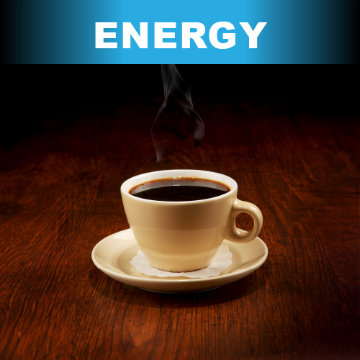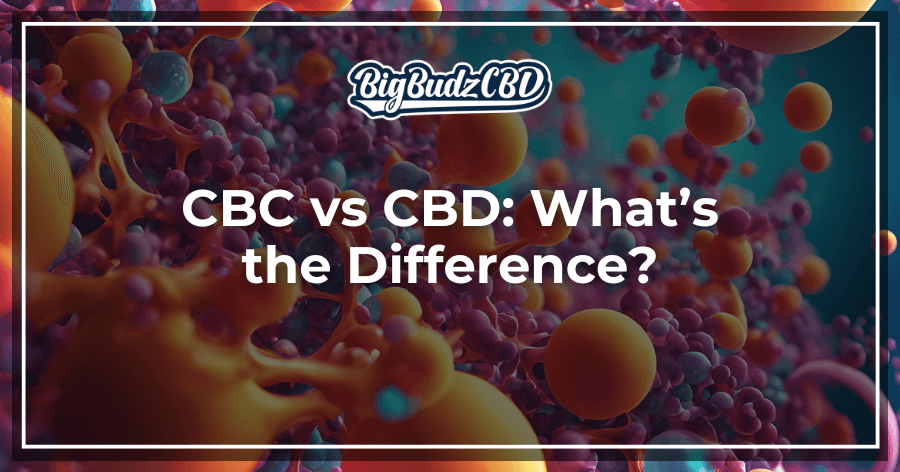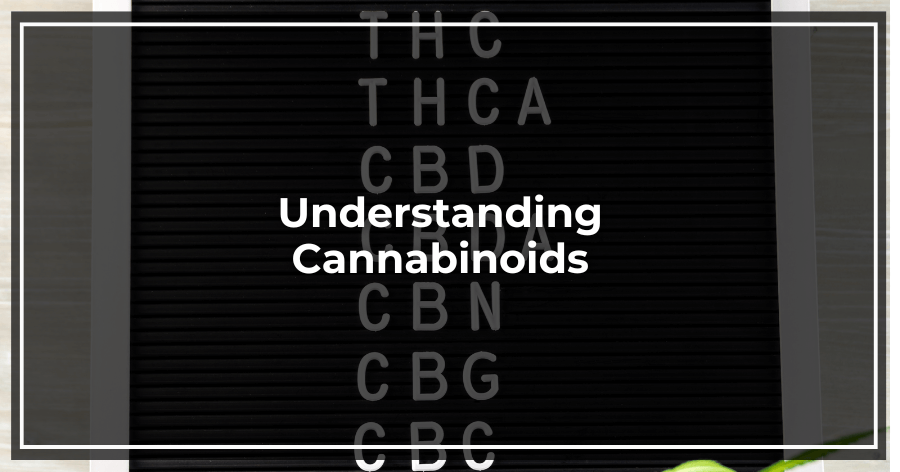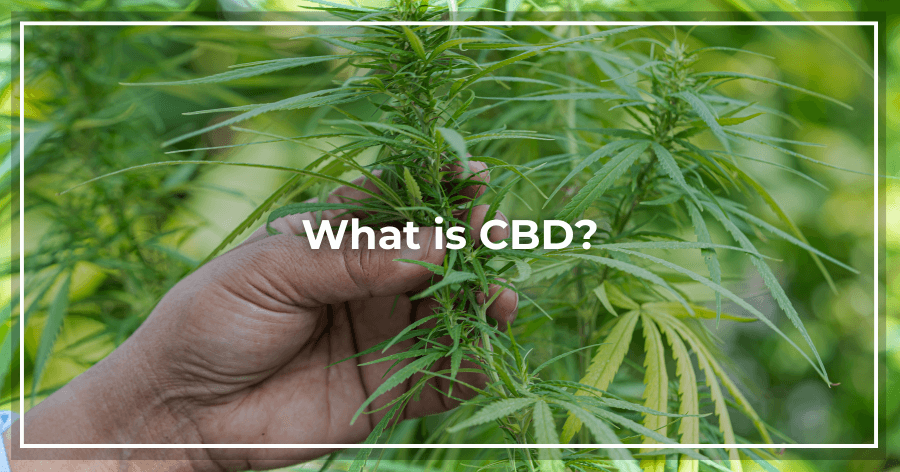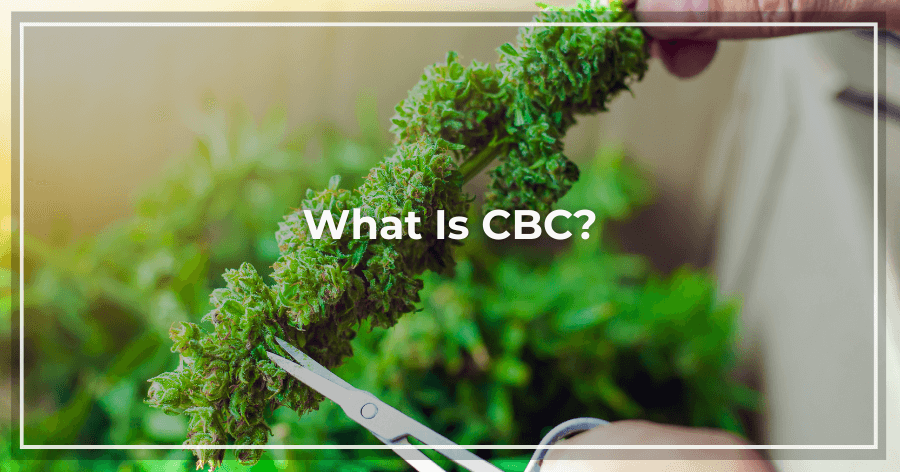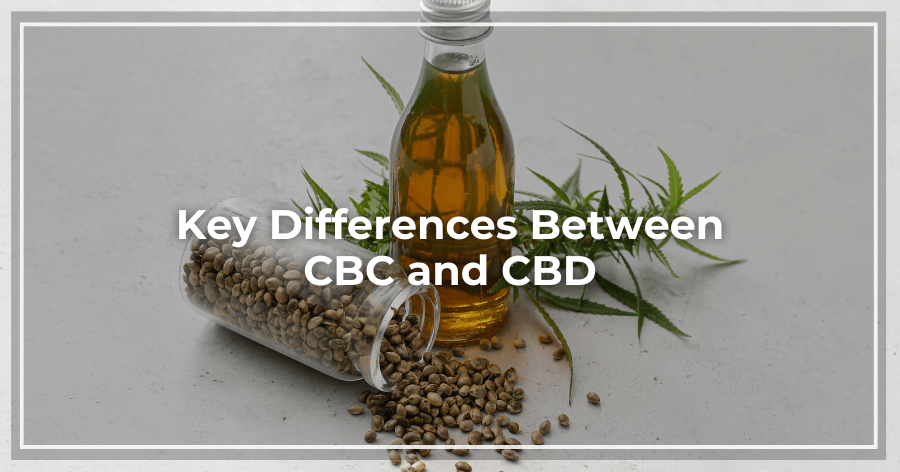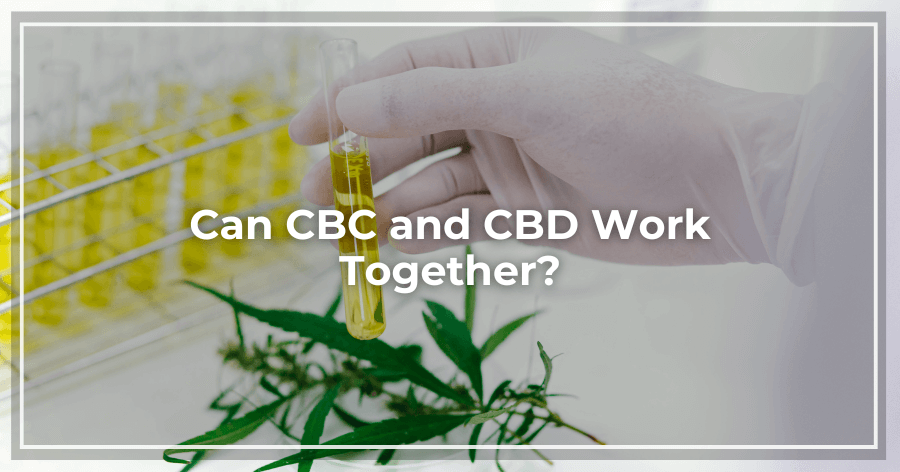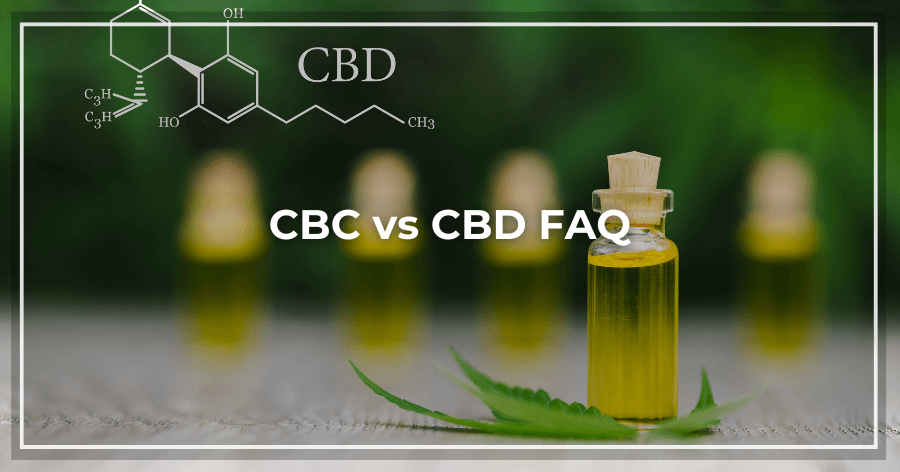As the push for cannabis-derived products gains increasing traction, more people than ever are eager to learn about the range of cannabinoids that are found in the plant and one of the big questions is what’s the difference between CBC vs CBD.
In particular, Cannabichromene (CBC) and Cannabidiol (CBD), are two compounds that have attracted attention for the potential therapeutic benefits they possess.
They include anti-inflammatory and anti-anxiety properties, which could reduce levels of discomfort or suffering when used as a method of treatment.
While many people have heard of CBD, CBC is not as well known. However, they share the common trait of being non-psychoactive, which means they won’t produce the ’high’ that is commonly associated with cannabis.
Yet, despite this commonality, they work in different ways and possess unique benefits, leading people to wonder what is the difference between CBC and CBD?
This guide aims to answer this question for you by outlining what they are and how both of these cannabinoids interact with the body.
It will also explore their potential health benefits and how they may complement each other if used together.
Understanding Cannabinoids
To better understand CBC and CBD, it’s necessary to have a basic grasp of cannabinoids and how they interact with our body.
Cannabinoids are naturally occurring compounds found in the cannabis plant.
They work by interacting with the body’s endocannabinoid system (ECS), which plays a role in regulating processes such as mood, appetite, immune function, and pain response.
The ECS consists of receptors (CB1 and CB2), endocannabinoids (compounds naturally produced by the body), and enzymes that break down these compounds.
The cannabinoids from cannabis can mimic or interact with our body’s endocannabinoids to influence these systems.
What Is CBD?
Cannabidiol, or CBD, is one of the most well-known cannabinoids and is often associated with a range of wellness products, including oils and creams. It is even found in some pet supplements.
However, unlike THC (tetrahydrocannabinol), the psychoactive compound in cannabis that produces a ‘high’, CBD is non-psychoactive.
For this reason, many people advocate that it is more acceptable for mainstream use.
How Does CBD Work?
CBD primarily interacts with CB2 receptors in the ECS, which are found in the immune system and peripheral organs rather than the brain.
However, CBD doesn’t directly bind to these receptors, but instead encourages the body to use more of its naturally produced endocannabinoids, in particular anandamide, which is often called the ‘bliss molecule’.
Due to its indirect influence on the ECS, CBD is thought to regulate a variety of bodily functions, including inflammation, immune response, and anxiety.
As a consequence of these potential therapeutic benefits, it has become popular in treating conditions such as chronic pain, anxiety disorders, epilepsy, and even some skin conditions.
Health Benefits of CBD
Due to its indirect influence on the ECS, CBD is thought to regulate a variety of bodily functions, including inflammation, immune response, and anxiety.
As a result, it has become popular in treating a range of conditions, such as arthritis and chronic back pain.
It has also been used to counter anxiety and depression because of its ability to affect serotonin receptors in the brain, which studies have shown could reduce symptoms of these disorders without the side effects of traditional medications.
In addition, one of the most well-known applications of CBD is its use in treating seizures associated with rare forms of epilepsy through the drug Epidiolex.
As it may help regulate the sleep-wake cycle by reducing anxiety and promoting relaxation, many people also use CBD to manage insomnia and other sleep-related issues.
Others who suffer from acne or psoriasis might also apply topical CBD products in the hope that their anti-inflammatory properties might reduce the likelihood of these skin conditions flaring up.
What Is CBC?
Cannabichromene (CBC) is another major cannabinoid found in cannabis, although it’s less popular than CBD, partly because it has not been studied as much.
That said, CBC is emerging as a cannabinoid with significant therapeutic potential, which is starting to capture people’s attention.
Interestingly, CBC doesn’t bind strongly to CB1 or CB2 receptors. Instead, it interacts with other receptors in the body, such as the TRPV1 and TRPA1 receptors, which are linked to pain perception.
Subsequently, this different mode of action makes CBC a potentially valuable tool for managing pain and inflammation, among other health conditions.
How Does CBC Work?
Like CBD, Cannabichromene is non-psychoactive, so it won’t produce the mind-altering effects associated with THC.
In fact, the effects it produces are mainly tied to its interaction with pain and inflammation receptors in the body, as opposed to directly affecting the ECS.
For this reason, it is viewed as a promising compound for pain relief – although more research is needed to fully understand its potential.
Health Benefits of CBC
Like CBD, CBC has been shown to have anti-inflammatory properties, and its interaction with pain receptors shows encouraging signs that it may be a good option for treating chronic pain.
Another interesting aspect of CBC is its ability to increase the levels of anandamide in the brain in a similar way to how CBD does.
As anandamide is a natural endocannabinoid which is involved in mood regulation and overall well-being, it is thought that by increasing anandamide levels, CBC could actually help to improve mood and reduce feelings of depression.
Moreover, some studies suggest that CBC may promote neurogenesis the growth of new brain cells. If this is found to be true (and research is still in the early stages), it could develop into a successful treatment for neurodegenerative diseases like Alzheimer’s and Parkinson’s disease.
Preliminary research also indicates that CBC may be effective in managing acne and other skin conditions due to its anti-inflammatory and anti-bacterial properties, although this remains to be seen.
Key Differences Between CBC and CBD
While CBC and CBD share some similarities, they differ in how they interact with the body, their mechanisms of action, and their potential uses.
For instance, CBD primarily interacts indirectly with CB2 receptors, while CBC interacts with the TRPV1 and TRPA1 receptors that are involved in pain perception.
This difference in receptor interaction is responsible for giving each cannabinoid a distinct effect on the body.
While both CBC and CBD are known for their anti-inflammatory properties, the former’s effect on pain and inflammation is thought to stem from its interaction with pain receptors.
By contrast, CBD is known to work by modulating the ECS.
Although it has been suggested that both cannabinoids may help with mood disorders, CBC’s ability to increase anandamide levels could make it especially effective for improving mood and potentially treating depression.
Additionally, despite both cannabinoids showing promise for treating skin conditions, CBC may have an edge in managing acne due to its anti-bacterial properties and anti-inflammatory effects.
Overall, as CBD has been far more extensively researched than CBC, there is a much larger body of scientific evidence to support its various health benefits.
At the other end of the scale, CBC, although promising, requires more studies to confirm its full range of effects.
Can CBC and CBD Work Together?
Given their relative benefits, some people wonder whether it is possible to use both CBC and CBD concurrently to improve their medical condition.
Known as the ‘entourage effect, this idea has yet to be scientifically proven with any great validity.
However, it developed from the theory that cannabinoids, terpenes, and other compounds in the cannabis plant may work together to improve their individual effects.
Some users have said they have experienced positive outcomes from utilising both these cannabinoids simultaneously.
But, their combined anti-inflammatory and analgesic benefits do need to be tested more extensively.
Conclusion
There is no definitive answer between which is a better form of medical marijuana, CBC vs CBD. So, the choice of which one you use basically boils down to your individual health needs and goals.
What is known is that the latter is already highly regarded for its potential to manage pain and anxiety, while the former has shown encouraging signs that it has the ability to improve neurological health and inflammatory conditions.
If you want to use either as part of a treatment for your medical condition, it is vital that you contact someone who specialises in cannabinoid therapy.
They will be able to help you decide on the cannabinoid that best suits your requirements based on your specific ailment, medical history, and what you want to achieve.
FAQs about CBC vs CBD
Here are some answers to questions people have about CBC vs CBD.
What is CBC?
CBC is short for Cannabichromene, which is a chemical which derives from the Cannabis plant.
Unlike some of the other chemicals that come from Cannabis, it does not impact thinking.
What is CBD?
CBD is a shortened term for the chemical compound cannabidiol.
It is one of over 100 chemical substances (cannabinoids) that are found in the cannabis plant and is a vital part of medical marijuana.
Here’s an extended FAQ for “CBC vs CBD: What’s the Difference?” in the requested format:
Q: What are the main differences between CBD and CBC?
A: The main difference between CBD and CBC is their chemical structure and effects.
CBD (cannabidiol) is more well-known and widely studied, while CBC (cannabichromene) is a lesser-known cannabinoid.
Both are non-psychoactive, unlike THC, but they interact with the endocannabinoid system differently.
CBD has more prominent anti-anxiety and anti-inflammatory effects, while CBC may have unique potential benefits in pain relief and neurogenesis.
Q: What are the potential benefits of CBC compared to CBD?
A: While CBD is known for its anti-anxiety and anti-inflammatory properties, CBC has shown potential benefits in areas where it may outperform CBD.
These include pain relief, neurogenesis (the growth of new brain cells), and possibly even cancer-fighting properties.
CBC may also have antimicrobial effects. However, more research is needed to fully understand the therapeutic benefits of CBC compared to CBD.
Q: Can I take CBD and CBC together?
A: Yes, you can take CBD and CBC together. In fact, many full-spectrum CBD products contain CBC along with other cannabinoids.
Taking them together may provide an “entourage effect,” where the combination of cannabinoids works synergistically to enhance their individual benefits.
However, always consult with a healthcare professional before combining any supplements or medications.
Q: Does CBC interact with the endocannabinoid system differently than CBD?
A: Yes, CBC interacts with the endocannabinoid system differently than CBD.
While CBD primarily interacts with CB2 receptors and influences other non-cannabinoid receptors, CBC has a more direct link to the CB2 receptors.
CBC also interacts with other receptors, such as TRPA1 and TRPV1, which are involved in pain perception and inflammation.
Q: Is CBC psychoactive like THC?
A: No, CBC is not psychoactive like THC. Similar to CBD, CBC does not produce the “high” associated with THC use.
This means you can use CBC without experiencing alterations in perception or cognitive function.
Both CBD and CBC are considered non-intoxicating cannabinoids.
Q: How do CBD oil and CBC oil differ?
A: CBD oil is typically extracted from hemp plants and contains high concentrations of CBD, while CBC oil contains higher levels of CBC. CBD oil is more widely available and has been studied more extensively.
CBC oil is less common and may be found in full-spectrum or broad-spectrum CBD products.
The effects and potential benefits of these oils differ based on their primary cannabinoid content.
Q: Can CBD or CBC show up on a drug test?
A: Pure CBD or CBC should not show up on most standard drug tests, as these tests typically screen for THC metabolites.
However, full-spectrum CBD products may contain trace amounts of THC, which could potentially result in a positive drug test.
CBC is even less likely to cause a positive result. To be safe, opt for CBD isolate or broad-spectrum products if you’re concerned about drug testing.
Q: Are there any side effects to using CBC or CBD?
A: Both CBD and CBC are generally well-tolerated, but they can have some side effects.
CBD may cause fatigue, changes in appetite, and diarrhea in some users.
As CBC is less studied, its side effects are not as well documented. However, it’s believed to have a similar safety profile to CBD.
Always start with a low dose when trying new cannabinoids and consult with a healthcare professional, especially if you’re taking other medications.


















